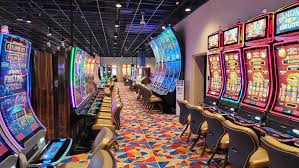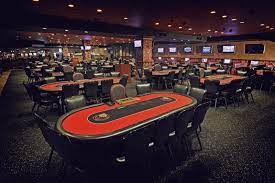West Virginia Casinos For Sale : 5 Golden Investment Opportunities

Welcome to the dynamic landscape of West Virginia Casinos For Sale , where opportunities abound for those seeking to enter the thriving world of gaming. In this article, we delve into the market of “West Virginia Casinos For Sale,” exploring the factors driving these sales, the regulatory environment shaping the industry, and the diverse array of casinos available for acquisition. Whether you’re a potential buyer, investor, or simply intrigued by the ever-evolving casino market, join us as we navigate through the essential aspects that define the current state and future prospects of West Virginia’s casino scene.
Introduction to West Virginia’s Casino Industry

West Virginia boasts a vibrant and dynamic casino industry, contributing significantly to the state’s economic landscape. The industry has evolved over the years, transforming West Virginia into a key player in the regional gaming scene. Nestled within the picturesque Appalachian Mountains, the state has become a hotspot for those seeking entertainment, gaming excitement, and lucrative investment opportunities.
The journey of West Virginia’s casino industry began in the 1990s when the state recognized the potential economic benefits of legalizing gambling. The subsequent years witnessed the establishment of several casinos, each contributing to the growth of the sector. Today, these establishments offer a diverse range of gaming experiences, from slot machines and table games to poker rooms and other entertainment options.
The casino industry in West Virginia has not only provided a source of entertainment for locals and tourists but has also become a vital contributor to the state’s revenue. Taxes generated from casino operations have supported various community development projects, education initiatives, and infrastructure improvements.
As we explore the prospect of West Virginia casinos for sale, it’s essential to understand the broader context of the industry. The competitive landscape, regulatory framework, and economic factors influencing the market will play a crucial role in shaping the opportunities and challenges associated with casino ownership in the state.
Overview of the Current Market for Casino Sales
The current market for casino sales in West Virginia reflects a dynamic landscape characterized by a blend of challenges and opportunities. Understanding the factors that contribute to the sale of casinos is essential for potential investors and industry enthusiasts alike.
Market Trends and Demand
The market trends in West Virginia’s casino industry play a pivotal role in shaping the decision to sell. Factors such as changing consumer preferences, advancements in technology, and the overall economic climate influence the demand for casino properties. Analyzing these trends provides valuable insights into the market’s pulse, allowing potential buyers to align their investments with evolving consumer interests.
Economic Factors
Economic conditions exert a significant impact on the decision to sell a casino. Fluctuations in the regional economy, consumer spending patterns, and broader financial trends can influence the profitability of casino operations. Sellers may be motivated by the need to capitalize on favorable market conditions or divest assets during economic uncertainties. For buyers, understanding these economic factors is crucial for assessing the long-term viability and potential return on investment.
Regulatory Influences
The regulatory environment in West Virginia is a key determinant in the casino sales market. Changes in gaming laws, licensing requirements, and compliance standards can prompt casino owners to consider selling their establishments. For buyers, staying abreast of these regulations is essential for navigating the intricacies of acquiring and operating a casino in compliance with state laws.
Competitive Analysis
A comprehensive overview of the current market involves assessing the competitive landscape. Identifying existing and potential competitors, understanding their market share, and evaluating their strategies provide valuable insights for both sellers and buyers. For sellers, recognizing the competitive pressures may drive the decision to sell, while buyers can leverage this information to position themselves strategically in the market.
Market Challenges and Opportunities
Examining the challenges and opportunities within the current market is essential for prospective investors. Challenges such as increased competition, changing consumer preferences, and regulatory complexities can impact casino operations. On the flip side, identifying opportunities, such as untapped markets or emerging gaming trends, can guide investors in making informed decisions when exploring West Virginia’s casinos for sale.
Factors Driving the Sale of West Virginia Casinos
The decision to sell a casino is influenced by a multitude of factors, and West Virginia’s gaming landscape is no exception. Understanding these driving forces is crucial for prospective buyers and investors looking to navigate the market effectively.
- Economic Considerations: The financial performance of a casino is a primary driver for its sale. Economic downturns, changes in consumer spending habits, or shifts in regional economic conditions can prompt owners to evaluate their assets. In some cases, selling a casino may be a strategic move to optimize returns or reallocate resources.
- Regulatory Changes: The gaming industry is highly regulated, and shifts in regulatory policies can impact operations. Changes in licensing requirements, tax structures, or other regulatory aspects may lead casino owners to reevaluate their position. Selling the property could be a response to navigate evolving legal landscapes or comply with new regulations.
- Industry Competition: Intense competition within the casino industry can drive owners to reassess their market position. The emergence of new competitors, changes in consumer preferences, or the introduction of innovative gaming options can influence the decision to sell. Owners may seek to capitalize on market demand or avoid potential challenges by divesting their assets.
- Strategic Portfolio Adjustments: For larger gaming corporations, selling a casino can be part of a broader strategic realignment. This may involve optimizing their portfolio by focusing on more lucrative markets, diversifying into different sectors, or streamlining operations to enhance overall efficiency.
- Changing Demographics and Consumer Trends: Shifting demographics and evolving consumer trends play a pivotal role in the casino industry. Changes in the target audience’s preferences, age distribution, or spending patterns can impact a casino’s success. Owners may decide to sell if they believe the property is not aligning with the evolving demands of the market.
- Operational Challenges: Internal operational challenges, such as management issues, maintenance costs, or the need for significant capital investments, can drive casino owners to consider a sale. Selling the property may be viewed as a strategic move to offload operational burdens and allow a new owner to bring fresh perspectives and solutions.
Regulatory Environment and its Impact on Sales

The casino industry in West Virginia operates within a carefully regulated framework that significantly influences business operations, expansions, and, in some cases, sales. A thorough understanding of the regulatory environment is essential for anyone considering the acquisition of a casino property in the state.
- Licensing and Compliance: Casino ownership in West Virginia requires adherence to strict licensing and compliance regulations. Changes in licensing requirements or compliance standards can impact the feasibility of continued ownership. In some instances, a sale may be initiated to ensure alignment with the latest regulatory mandates.
- Taxation Policies: Taxation is a critical aspect of the regulatory landscape for casinos. Alterations in tax structures, rates, or the introduction of new taxes can significantly affect the financial viability of casino operations. Owners may decide to sell if the current taxation policies pose challenges or if restructuring the ownership aligns better with tax optimization strategies.
- Gaming Laws and Restrictions: The state’s gaming laws and restrictions play a pivotal role in shaping the casino industry. Any amendments or new regulations governing permissible games, betting limits, or operational hours can impact revenue streams. Owners may evaluate the impact of these changes on their business and opt for a sale if it aligns with their strategic interests.
- Community and Political Dynamics: The casino industry often operates at the intersection of community and politics. Public sentiment and political decisions can influence the regulatory landscape. Changes in leadership or shifts in community attitudes towards gambling may prompt owners to reassess their position and consider a sale.
- Competition and Monopoly Regulations: Regulatory bodies may intervene in instances where there are concerns about monopolistic practices or insufficient market competition. Owners might face pressure to divest assets to promote a more competitive market. Understanding the regulatory stance on market competition is crucial for both sellers and potential buyers.
- Social Responsibility and Responsible Gaming: With an increasing focus on social responsibility, regulatory authorities may introduce measures to promote responsible gaming. Owners may choose to sell if they anticipate challenges in aligning their operations with evolving expectations regarding player protection and responsible gaming practices.
Economic Trends Affecting Casino Ownership
The ownership and operation of casinos in West Virginia are intricately tied to broader economic trends, and understanding these trends is essential for anyone considering the acquisition of a casino property. Economic factors can significantly impact a casino’s performance, influencing both its profitability and long-term sustainability.
- Tourism and Visitor Trends: The success of a casino is often linked to tourism and visitor trends. Economic downturns, changes in travel patterns, or shifts in the popularity of destination choices can affect the number of visitors to a casino. Owners may consider selling if they anticipate challenges in attracting and retaining a steady flow of patrons.
- Disposable Income and Consumer Spending: The disposable income of the target demographic plays a crucial role in casino revenue. Economic fluctuations and changes in consumer spending habits can directly impact the willingness of individuals to engage in gaming activities. Owners may decide to sell if economic conditions pose challenges to sustaining a profitable customer base.
- Employment and Labor Market Conditions: The economic health of the region, particularly in terms of employment rates and labor market conditions, influences the local population’s discretionary spending. A decline in employment or unfavorable labor market trends may lead casino owners to reassess their investment and consider a sale.
- Real Estate Market Dynamics: The real estate market’s performance can affect the value of casino properties. Shifts in property values, demand for commercial real estate, or changes in the overall real estate market climate may impact the decision-making process for casino owners considering a sale.
- Interest Rates and Financing Options: The cost of capital and access to financing are critical considerations for casino owners. Changes in interest rates or challenges in securing favorable financing options may prompt owners to explore the possibility of a sale, especially if they perceive financial constraints hindering future investments or expansions.
- Technological Advancements: The gaming industry is not immune to technological advancements. Owners may evaluate the impact of new technologies on customer preferences and operational efficiency. Those facing challenges in adapting to the latest trends may choose to sell, allowing a new owner to implement technological upgrades.
Profiles of Casinos Available for Sale

Exploring the diverse profiles of casinos available for sale in West Virginia provides prospective buyers with a comprehensive understanding of the market offerings. Each casino property carries its own unique features, financial history, and growth potential, making it essential for investors to conduct thorough due diligence before making acquisition decisions.
- Size and Scale: Casinos in West Virginia vary in size and scale, from smaller boutique establishments to expansive resort-style properties. Understanding the scale of a casino is crucial for buyers, as it influences operational complexities, staffing requirements, and potential for revenue generation.
- Gaming Portfolio: The gaming portfolio of each casino distinguishes it in the market. Properties may specialize in slot machines, table games, poker rooms, or a combination of these. Buyers should assess the existing gaming offerings, considering market demand and potential for diversification.
- Location and Accessibility: The geographical location of a casino plays a pivotal role in its success. Proximity to population centers, tourist attractions, or major transportation hubs can impact foot traffic. Buyers must evaluate the location and accessibility to ensure alignment with their strategic goals.
- Facility Amenities and Entertainment: Beyond gaming, amenities and entertainment options contribute to a casino’s appeal. Facilities with hotels, restaurants, live entertainment venues, or other attractions may have a competitive edge. Buyers should consider the overall guest experience and potential for additional revenue streams.
- Financial Performance and History: A comprehensive review of a casino’s financial performance and historical data is paramount. Buyers must analyze revenue trends, profitability, and any notable financial events. Understanding the financial health of the property provides insights into its potential for future success.
- Regulatory Compliance and Licenses: The regulatory status of a casino is a critical aspect of due diligence. Buyers should verify the property’s compliance with licensing requirements, any outstanding regulatory issues, and the potential impact on future operations. Ensuring a smooth transition in ownership is essential.
- Brand Recognition and Reputation: Established brand recognition and a positive reputation within the community contribute to a casino’s success. Buyers should assess the property’s standing in the market, customer reviews, and any past public relations issues. A well-regarded brand can facilitate a smoother transition under new ownership.
- Expansion and Development Opportunities: Some casino properties may come with opportunities for expansion or development. Buyers should explore the potential for adding new amenities, increasing gaming options, or enhancing existing infrastructure to capitalize on market trends and maximize returns.
West Virginia Casinos For Sale Conclusion
In conclusion, the exploration of “West Virginia Casinos For Sale” unveils a multifaceted industry shaped by economic, regulatory, and operational dynamics.
As we’ve delved into the driving factors behind casino sales, the intricate regulatory environment, the influence of economic trends, and the diverse profiles of available properties, it becomes evident that prospective buyers and investors must conduct meticulous due diligence.
West Virginia’s casino market offers both challenges and opportunities, with each property presenting a unique set of features and potential for growth.
As the industry continues to evolve, strategic decision-making, adaptability to regulatory changes, and a keen understanding of market dynamics will be paramount for those looking to navigate and thrive in this dynamic sector.
Whether one’s interest lies in the thrill of gaming or the promise of a lucrative investment, the landscape of West Virginia’s casinos for sale invites exploration and strategic consideration in the pursuit of success within this ever-exciting industry.
FAQs – West Virginia Casinos For Sale
1. What factors drive the sale of casinos in West Virginia?
- Casinos in West Virginia may be sold due to economic considerations, changes in regulatory environments, industry competition, strategic portfolio adjustments, shifting demographics, and operational challenges.
2. How does the regulatory environment impact casino sales?
- The regulatory landscape, including licensing, taxation, gaming laws, and community dynamics, significantly influences casino sales. Changes in regulations may prompt owners to consider selling to ensure compliance or navigate evolving legal frameworks.
3. What economic trends affect casino ownership in West Virginia?
- Economic trends such as tourism patterns, disposable income, employment rates, real estate market dynamics, and technological advancements impact casino performance. Owners may decide to sell based on shifts in these economic factors.
4. What should buyers consider when exploring profiles of casinos for sale?
- Buyers should assess the size and scale, gaming portfolio, location, amenities, financial performance, regulatory compliance, brand recognition, and potential for expansion or development when exploring casino profiles. A comprehensive understanding of these factors is crucial for making informed acquisition decisions.
5. How do brand recognition and reputation play a role in casino acquisitions?
- Established brand recognition and a positive reputation contribute to a casino’s success. Buyers should evaluate a property’s standing in the market and its reputation within the community to ensure a smooth transition under new ownership.
6. Are there opportunities for expansion and development with casinos for sale?
- Yes, some casino properties may come with opportunities for expansion or development. Buyers should explore the potential for adding new amenities, increasing gaming options, or enhancing existing infrastructure to maximize returns.
7. How can investors navigate the dynamic landscape of West Virginia’s casino industry successfully?
- Investors can navigate successfully by staying informed about regulatory changes, conducting thorough due diligence on available properties, understanding economic trends, and making strategic decisions based on the unique characteristics of each casino for sale.
8. What role does the community and political dynamics play in casino sales?
- Community sentiment and political decisions can influence casino sales. Changes in leadership or shifts in community attitudes towards gambling may prompt owners to reassess their position and consider a sale.
9. How can prospective buyers adapt to the evolving West Virginia Casinos For Sale ?
- Prospective buyers can adapt by being flexible, staying informed about industry trends, building a deep understanding of the regulatory environment, and conducting comprehensive due diligence before making acquisition decisions.
10. What is the overall outlook for West Virginia Casinos For Sale ?
- The overall outlook is dynamic, with a mix of challenges and opportunities. As the industry continues to evolve, strategic decision-making and a thorough understanding of market dynamics will be essential for success in West Virginia’s casino market.


